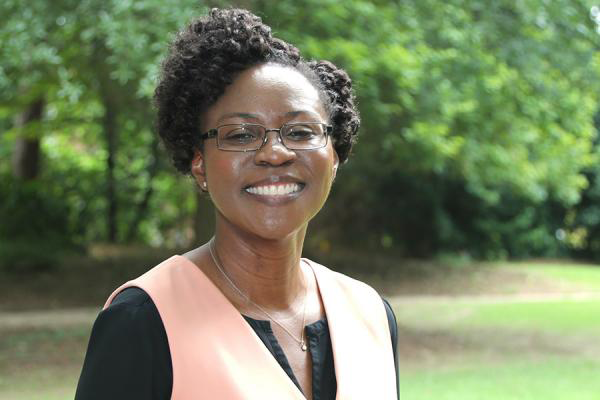
Amekudzi-Kennedy’s Philosophy Encourages Diversity in STEM, Engineering Workforce
Adjo Akpene Amekudzi-Kennedy (MS ’97, PhD ‘99), Professor and Associate Chair for Global Engineering Leadership & Entrepreneurship in the School of Civil & Environmental Engineering at Georgia Tech, believes that diversity within the workforce benefits the engineering field. “There is so much potential in having a well-educated population, a strong and large STEM workforce—with women, minorities, and all populations engaged and excelling in STEM and other professions,” she states.
An instructor, researcher, author, and curriculum developer, Amekudzi-Kennedy is focused on the study, development and application of systems and sustainability engineering methods to promote sustainable development. And as the winner of numerous awards and other accolades, Amekudzi-Kennedy says that she’s most grateful when she’s recognized for contributions that improve the human condition and community quality of life. Regarding projects completed with (or for) students, she says: “Those awards stand for enhancing undergraduate education, developing leaders, graduates with cross cultural competency, and a more holistic understanding of the world and its successes and challenges.”
Her time as a student at CEE taught Amekudzi-Kennedy to think more rigorously and systemically. “It is one of the places where interdisciplinary thinking occurs at a very high level. When I recall my time at CMU, I think of learning how to think better, in multidimensional terms and more holistically.” She adds that she was especially humbled to receive the CEE 2021 Distinguished Alumni Award. “Being recognized by CEE is special because it’s a place where thinking, in general, happens at a very high level.”
“Develop a network. And support others - particularly those who have less support - to develop and excel in their careers.”
She cites former CEE Professor Sue McNeil’s Infrastructure Management, and EPP Professor Granger Morgan’s Introduction to the Theory and Practice of Policy Analysis, and former CEE Professor Dan Rehak’s Computer-Aided Tools as some of her most influential courses at CEE. In addition, EPP Professor Joel Tarr’s historical analyses of brownfields and infrastructure and their relevance to existing conditions. “They shaped my thinking—the courses were demanding and pushed us to think across disciplines, think critically and think holistically. I carried these ways of thinking forward with me.”
Amekudzi-Kennedy’s current research addresses resilient and sustainable communities and infrastructure. One of her projects is examining the issue of how a community may build resilience to future threats that it does not know, has not experienced before, does not understand fully, and cannot predict or characterize. She’s also working on a project that looks into how an agency may move in the most efficient manner to augment its capabilities for planning and decision making to create an increasingly resilient system. Additional research includes an AT&T Climate Resilience Community Challenge project that studies inland flooding in the state of Georgia.
Amekudzi-Kennedy is the founding Chair of the American Society of Civil Engineers’ Committee on Sustainability and the Environment and served on the Board on Infrastructure and the Constructed Environment (National Research Council) at different times over a 10-year period. She is also on the Transportation Asset Management Committee of the Transportation Research Board, a fellow of the American Society of Civil Engineers, and a member of the National Academy of Construction.
She states that the most important thing current CEE students can do to build their visibility in the field is to make connections. “Develop a network. And support others - particularly those who have less support - to develop and excel in their careers.”